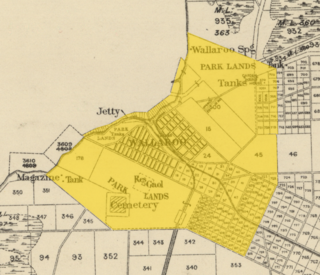Related Research Articles

Scott of the Antarctic is a 1948 British adventure film starring John Mills as Robert Falcon Scott in his ill-fated attempt to reach the South Pole. The film more or less faithfully recreates the events that befell the Terra Nova Expedition in 1912.

Eyre Highway is a 1,664-kilometre (1,034 mi) highway linking Western Australia and South Australia via the Nullarbor Plain. Signed as National Highways 1 and A1, it forms part of Highway 1 and the Australian National Highway network linking Perth and Adelaide. It was named after explorer Edward John Eyre, who was the first European to cross the Nullarbor by land, in 1840–1841. Eyre Highway runs from Norseman in Western Australia, past Eucla, to the state border. Continuing to the South Australian town of Ceduna, it crosses the top of the Eyre Peninsula before reaching Port Augusta.

Edward John Eyre was an English land explorer of the Australian continent, colonial administrator, and Governor of Jamaica.

John Edward Hawkins, CBE was an English actor who worked on stage and in film from the 1930s until the 1970s. One of the most popular British film stars of the 1950s, he was known for his portrayal of military men.

Gundagai is a town in New South Wales, Australia. Although a small town, Gundagai is a popular topic for writers and has become a representative icon of a typical Australian country town. Located along the Murrumbidgee River and Muniong, Honeysuckle, Kimo, Mooney Mooney, Murrumbidgee and Tumut mountain ranges, Gundagai is 390 kilometres (240 mi) south-west of Sydney. Until 2016, Gundagai was the administrative centre of Gundagai Shire local government area. In the 2021 census, the population of Gundagai was 2,057.

Robert Edward Stevenson was a British-American screenwriter and film director.

Wylie was an indigenous Australian originally from the King George Sound tribe around Albany in Western Australia. He accompanied Edward John Eyre to Adelaide by sea in May 1840, and would have left with Eyre on his expedition to penetrate to the interior in June of the same year, but Wylie was ill. Later in the year, Eyre was at Fowlers Bay in the west, having retreated from the north, and Wylie joined him by way of the ship supplying the expedition, the Hero.
John Baxter was an Irish convict who became an Australian pioneer, overlander, explorer, and offsider of explorer Edward John Eyre.

The Australian Institute of Architects, officially the Royal Australian Institute of Architects, is Australia's professional body for architects. Its members use the post-nominals FRAIA (Fellow) and RAIA. The Institute supports 14,000 members across Australia, including 550 Australian members who are based in architectural roles across 40 countries outside Australia. SONA is the national student-membership body of the Australian Institute of Architects. EmAGN represents architectural professionals within 15 years of graduation, as part of the Australian Institute of Architects.
The Australian Amateur is the national amateur golf championship of Australia. It has been played annually since 1894, except for the war years, and is organised by Golf Australia. Having traditionally been a match play event, from 2021 it has been a 72-hole stroke play event, having last been played as a stroke play event in 1907.

The Barngarla, formerly known as Parnkalla and also known as Pangkala, are an Indigenous people of South Australia and the traditional owners of much of Eyre Peninsula. Their language, Barngarla is a Yura language and part of a revival effort by the University of Adelaide.

Edward Bate Scott was a pioneering colonist of South Australia who accompanied Edward John Eyre on several journeys and had a later career with the South Australian Police Force.
Charles Christian Dutton was a pastoralist in the Colony of South Australia who disappeared, believed murdered by Aboriginal people, while driving cattle from Port Lincoln to Adelaide in July 1842.

The Corporate Town of Wallaroo was a local government area in South Australia from 1874 to 1997, centred on the town of Wallaroo.
Alfred Miller Mundy was an English military officer in colonial New South Wales, who after leaving the army served in the Legislative Council of South Australia, from 15 June 1843 to 14 May 1849.
The District Council of Green's Plains was a local government area in South Australia from 1871 to 1888. It was the first local government on the Yorke Peninsula.
Elizabeth Whitby was founder and principal of a school for girls in Carrington Street, Adelaide, one of the first in the Colony of South Australia, founded in 1848.
Francis Patrick Eyre was an Australian professional golfer. He won the 1926 Sun-Herald Tournament and the 1930 Australian Open.
Gladstone Eyre was an Australian portrait artist and landscape painter around Sydney, New South Wales and Launceston, Tasmania in the late 19th and early 20th centuries.
John Robertson Tranthim-Fryer was an Australian sculptor and educator, the first director of what became Victoria's Swinburne Technical College.
References
- ↑ "Advertising". The Canberra Times . Vol. 36, no. 10, 253. Australian Capital Territory, Australia. 16 June 1962. p. 19. Retrieved 1 January 2024– via National Library of Australia.
- ↑ "Noted Lecturer to Visit". The Beverley Times . Vol. 57, no. 31. Western Australia. 3 August 1962. p. 1. Retrieved 1 January 2024– via National Library of Australia.
- ↑ Stewart, Douglas (1965). Poetry in Australia. p. 239.
- ↑ "Moyor Unveils Memorial To Edward John Eyre". Port Lincoln Times . Vol. XXVIII, no. 1607. South Australia. 15 December 1955. p. 1. Retrieved 1 January 2024– via National Library of Australia.
- ↑ Edward john Eyre at Fryer Library
- ↑ "Story of Scott is fine local work". The Age. 14 June 1962. p. 24.